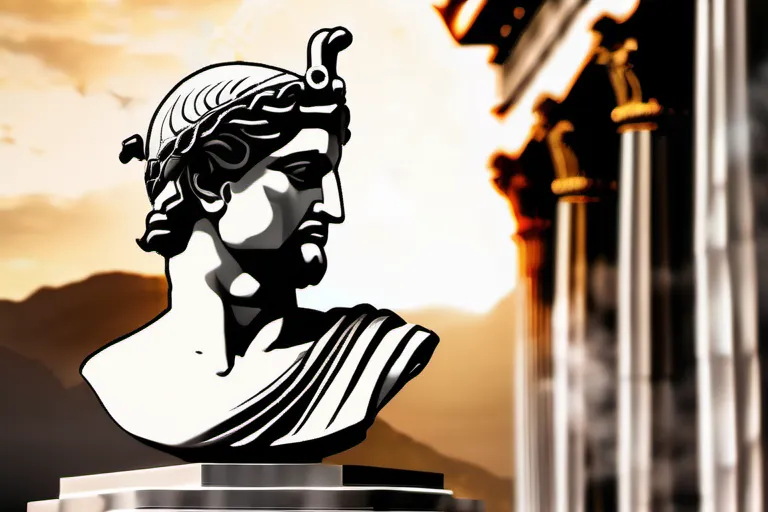Exploring the ancient Greek religion’s teachings on spirituality, morality, and life.
Hellenic Polytheism, also known as Ancient Greek Religion, offers a unique perspective on spirituality and life. This article delves into the teachings of this polytheistic system and its impact on ancient Greek culture.
The Pantheon: Understanding the Greek Gods
Imagine wandering through the Hellenic Pantheon, each deity representing a facet of life, much like the layers of an onion. How do these gods influence our understanding of spirituality and life? In Hellenic Polytheism, every god has a distinct role, personality, and attribute, making them more than just figures in ancient myths.
Consider Apollo, the god of light, music, prophecy, and healing. How do his attributes reflect the balance between reason and intuition that many seek in modern life? Is it not fitting that in today’s world, we also need to find harmony between our logical minds and our intuitive hearts?
Do we not yearn for guidance just as Athena, goddess of wisdom and courage, offered to those seeking her favor? In Hellenic Polytheism, the gods are not distant entities but close companions who can help us navigate life’s challenges. Athena’s wisdom can be seen in everyday decision-making, while her courage encourages us to face our fears with bravery.
Then there is Hades, god of the underworld, often misunderstood as a malevolent force. But his role extends beyond death; he symbolizes transformation and renewal. Could it be that every challenge we face is an opportunity for rebirth, much like Hades’ realm?
Zeus, king of the gods, represents power and order. His thunderbolts remind us of the consequences of our actions. In a world where choices shape destinies, isn’t it crucial to act with wisdom and integrity?
The Hellenic Pantheon teaches that life is not merely a straight path but a complex journey filled with many paths to explore. Each god offers a different lens through which we can view the world and ourselves. By understanding their roles, we gain insight into the multifaceted nature of spirituality and life.
In this religion, the gods are not just worshipped; they are lived. Their attributes guide our actions, shaping our values and behaviors. Thus, Hellenic Polytheism provides a framework for living a meaningful life, where every moment is an opportunity to connect with these divine aspects within us.
Rituals and Worship: Connecting with the Divine
Imagine stepping into an ancient Greek agora, filled with the scent of incense and the murmur of voices. The sun filters through the canopy of olive trees, casting shadows over a bustling marketplace where people offer prayers and sacrifices to their gods. In this environment, Hellenic Polytheism thrives not just as a set of beliefs but as a way of life deeply intertwined with daily rituals and worship.
What does Hellenic Polytheism teach about spirituality and life? It’s like navigating through a dense forest, where every path leads to different temples and altars. Just as one might choose their route based on the story they want to hear or the god they wish to honor, Hellenes engaged in various rituals tailored to their needs and beliefs.
Consider the Hekatompedos, a simple yet profound ritual involving offerings of wine, honey, and fruit. These offerings symbolize sustenance and gratitude—offering back what nature provides. Through such acts, individuals felt a deep connection with the divine, believing that their actions could influence fate and fortune.
Moreover, Hellenic Polytheism emphasized communal worship through festivals like the Dionysia and Eleusinian Mysteries. These events were not just celebrations but rites of passage that fostered a sense of belonging and shared identity. By participating in these grand gatherings, people found solace, inspiration, and a reminder of their place within the cosmos.
Each ritual was more than a performance; it was a lived experience that enriched one’s spiritual journey. The act of worship became a dialogue between the mortal and immortal realms, where prayers were heard and answered in the ever-shifting tapestry of life. In this way, Hellenic Polytheism taught that spirituality is not just about belief but action, connection, and harmony with the divine.
Through these rituals and worship practices, Hellenes discovered profound truths about the nature of existence—embracing their roles in the grand drama of life. The gods were not distant beings but present companions, guiding and protecting their faithful through the trials and joys of mortal experience. In this intricate dance with divinity, Hellenic Polytheism offered a path to meaning, purpose, and a richer understanding of what it means to be alive.
Moral Teachings: Ethics in Ancient Greek Religion
In Hellenic Polytheism, the gods are not distant figures but deeply intertwined with human life, much like threads woven into the fabric of existence. How then do we understand their teachings on morality and ethics in our daily lives? Are these lessons merely historical curiosities or do they still hold relevance today?
Consider the virtues celebrated by the ancient Greeks—justice, courage, temperance, and wisdom. These are not just abstract concepts but practical guidelines for living a good life. How does courage, for example, manifest in everyday situations? Is it as simple as standing up to fear, or is it something more complex, like the bravery required to make difficult choices that benefit the community?
The gods’ moral teachings are often portrayed through stories and myths, which serve as cautionary tales and inspirations. For instance, Medea’s betrayal of Jason can teach us about the consequences of our actions and the importance of loyalty. Similarly, the tale of Ajax, who falls to his own hubris, warns against arrogance and reminds us that even the mighty can be brought down.
In Hellenic society, these values were not just taught in schools but lived out through communal rituals and personal practices. The idea was that by emulating the gods’ virtues, one could achieve a harmonious life both personally and socially. Is it so different today? Can we still learn from the ancient Greeks about how to navigate the complexities of modern life with wisdom and integrity?
Moreover, the concept of hubris—excessive pride or self-confidence—is a stark reminder that even in our achievements, we must remain humble. This notion challenges us to consider the limits of human pride and the dangers it can pose when unchecked.
Through the lens of Hellenic Polytheism, we see that moral teachings are not static but dynamic, evolving as society changes. They offer a timeless framework for understanding our place in the world and the responsibilities that come with being part of a larger community. Do these ancient lessons still resonate with us today, or have they become obsolete in our modern world?
The Role of Heroes: Mortals and Immortals
Imagine the world through the eyes of ancient Greeks, where every corner held stories of gods and heroes. In Hellenic Polytheism, heroes are more than just legendary figures; they embody the essence of mortal potential and divine favor. How do these heroes connect with the immortal deities? And what can we learn from their journey?
Heroes like Hercules, who undertook his famous twelve labors, or Achilles, whose story echoes in The Iliad, serve as a bridge between mortals and gods. They illustrate the idea that greatness can be achieved through dedication and virtue. But why is this connection so crucial? Could it be that heroes act as messengers of divine will, guiding humans to live more fulfilling lives?
Consider the relationship between Prometheus, who defied Zeus by giving fire to humanity, and his eventual punishment in the form of eternal suffering. This tale raises questions about the balance between divine authority and human rights. Does this story suggest that even heroes face consequences for their actions? How do these narratives impact our understanding of morality?
The journey of Aeneas, who was destined to found Rome, symbolizes the quest for identity and destiny. His travels and struggles mirror the complex relationship between the mortal realm and the divine. Could his story be a metaphor for the spiritual path we all embark on? How do these tales inspire us to face our own challenges with courage and perseverance?
Heroes in Hellenic Polytheism serve as touchstones, providing us with examples of how to live a virtuous life. They remind us that even in the face of adversity, we can achieve greatness by seeking divine guidance. These narratives offer lessons on ethics, morality, and the pursuit of excellence – all integral parts of Hellenic spirituality.
So, as you explore these tales, ponder: what qualities do heroes possess that make them worthy of reverence? And how can their stories inform our own spiritual journeys?
Mythology: Stories that Shaped a Culture
Mythology: Stories that Shaped a Culture
Imagine stepping into ancient Greece, where every stone and tree whispered tales of gods and heroes. The myths of Hellenic Polytheism were not mere stories; they were the fabric of daily life, guiding behavior, shaping beliefs, and defining the very essence of what it meant to be human in that society. How did these myths influence spiritual practices and everyday life?
Consider the Labors of Heracles. These twelve tasks are not just a string of challenges; they represent the struggle between the mortal and the divine, embodying courage, perseverance, and sacrifice. Each labor teaches us about the virtues needed to navigate life’s hardships, much like navigating the treacherous waters of the Arkhisepos, the deep-sea monster.
The stories of these gods are more than just narratives; they mirror human emotions and experiences. Take Demeter and Persephone’s story. The goddess’ sorrow over her daughter’s abduction by Hades is a poignant tale of loss, grief, and eventual renewal, symbolizing the cycle of life itself. Could this not also be seen as a metaphor for the changing seasons or even personal cycles of birth, death, and rebirth?
Moreover, these myths taught moral lessons through their characters’ actions. The hubris of Tantalus, whose punishment reflects his pride and impiety, warns against arrogance and disrespect towards the gods. Conversely, the humility and piety of Eumelos offer a path to salvation and favor in the divine realm.
In essence, these myths were more than mere entertainment; they were a school for the soul, teaching us about our place in the cosmos, our duties towards each other, and our connection to the divine. By understanding and internalizing these stories, one could live a virtuous life, just as Theseus did when he ventured into the labyrinth to slay the Minotaur.
Could it be that through the retelling of these myths, Hellenic Polytheism provided a framework for spiritual growth and moral guidance? As we delve deeper into the tales, we find not just entertainment but profound insights into human nature and our relationship with the divine. These stories continue to resonate today, serving as timeless lessons in life, morality, and spirituality.
The Legacy of Hellenic Polytheism: Influence on Western Religion and Philosophy
Imagine stepping into the ancient streets of Athens, where the air is thick with history and the echoes of gods whisper through every alleyway. Hellenic Polytheism, with its vibrant pantheon of deities, teaches us profound lessons about spirituality and life that continue to resonate today. How do the gods of Olympus guide our moral compasses? Can we truly find meaning in a world filled with chaos and uncertainty?
At the heart of Hellenic Polytheism lies the idea that each god represents a facet of human experience, from love and beauty (Aphrodite) to wisdom and reason (Apollo). By understanding these deities, one can navigate life’s complexities. For instance, how does Athena’s wisdom inspire us to make informed decisions in our daily lives? Can we draw strength from Zeus’s authority during moments of leadership?
The concept of dharma or duty is central; each person has a role to play within their community. This idea, deeply rooted in Hellenic culture, encourages us to find our place and purpose in the world. How often do we neglect these responsibilities, allowing life’s distractions to pull us off course? The stories of heroes like Perseus or Hercules remind us that even the most ordinary among us can achieve greatness by fulfilling their destiny.
Moreover, Hellenic Polytheism challenges us to confront the unknown. Just as the gods are mysterious and often beyond human comprehension, life itself is a mystery waiting to be explored. The myth of Orpheus and Eurydice questions our mortality: can we truly live a meaningful existence if we fear death? What does it mean to love someone so deeply that you would risk everything to bring them back from the underworld?
In exploring Hellenic Polytheism, we find not only rich narratives but also timeless lessons about what it means to be human. These teachings remind us of our interconnectedness with the divine and each other, urging us to live lives of integrity, courage, and compassion. Could there be a more compelling path to understanding ourselves and our place in this vast universe?
Conclusion
 In conclusion, Hellenic Polytheism provides valuable insights into the spiritual lives of the ancient Greeks and their understanding of the world. By examining the gods, rituals, and moral teachings, we can gain a deeper appreciation for this fascinating religion.
In conclusion, Hellenic Polytheism provides valuable insights into the spiritual lives of the ancient Greeks and their understanding of the world. By examining the gods, rituals, and moral teachings, we can gain a deeper appreciation for this fascinating religion.











